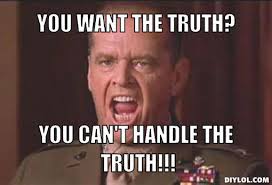This post and the previous one are about the biggest surprise lessons of my MBA program now that I look back on its value and application. Last week I discussed a timeless model for analyzing business challenges, typically from an operations perspective. This week’s big MBA lesson involves organizational leadership and speaking truth to power.

As we studied group behavior, management and organizational leadership – a common foundation was drilled into our heads – speaking truth to power. The most effective business cultures are those that are open and accepting of blunt truth from peers or lower levels within the organization. This is a fancy way of saying they don’t hide from the truth; they don’t sugarcoat; their management meetings are not a bunch of ‘yes men.’ Someone can walk into the president’s office and say, ‘hey, our new product line sucks and costs us money for all the mistakes and hand holding with clients. We need to scrap it and stop the bleeding.’ And after the truth has been told to the powers that be – the person in power doesn’t drop a bomb and gossip to the guy who built it, he doesn’t sweep truth under the rug, he doesn’t tell the messenger to mind his own business. Instead, the leader whole heartedly listens to his front line employee, takes the truth to make the place better, and nobody’s feelings get hurt.
Easier said than done. I’ve heard it said that ‘the higher you climb in leadership, the less coworkers are willing to be honest with you.’ We’ve all been in the meeting where we bite our tongue, or have the ‘meeting-after-the-meeting’ where we gripe to one person. Or we’ve been the messenger that gets shot. Or we’ve even been the person that did speak truth to power that wasn’t heard and three months later there comes a huge, ‘I told you so’ moment when the wound suddenly becomes infected and now we have to amputate.
In my MBA program I brushed past this as the world’s most obvious organizational leadership principal. Tell ’em the truth, duh. But a few years in a startup and working with hundreds of businesses has shown me just how rare it is to see cultures where one can actually speak truth to power. I’ve had amazing coworkers quit or seen top performers submit themselves to just getting by because there was one instance where they tried to speak truth to power and were told to shut up and get in line.
Part of the issue is our own get-along-goggles. In school we learned to get along with everyone. Mom told us not to say anything that wasn’t nice. Coach made us run sprints for voicing opinions. We’ve seen the Yes Men rise the ranks by kissing enough ass. Even our lizard brain tells us that its best for our long term survival to follow the herd. On the whole it is uncomfortable and uncommon to actually speak truth to power, let alone have it heard and digested.
So as smart as the leader may be and as big as his ego – he will never be greater than the sum of his team members. Nor will he know his clients and product better than the front line employees who touch it every day.
The good news is the lesson can be applied even if you’re not at the tip top of the company food chain. Speaking truth to power applies within the smallest teams and can have a transformative effect throughout an organization. But first we must appreciate the benefits that speaking truth to power can have on employee engagement and accountability. From there – we must have open forums, make sure genuine feedback occurs and actually follow up on recommendations. Otherwise, groupthink and complacency will set in before we know it.
Thoughts? Have you been part of a culture where one could speak truth to power? Or have you seen the opposite effect? What’s the best format for speaking truth to power?


